2013版初中英语全程复习方略课件(教材复习案)七年级下册 Units 5-8(冀教版)(共55张PPT)
文档属性
| 名称 | 2013版初中英语全程复习方略课件(教材复习案)七年级下册 Units 5-8(冀教版)(共55张PPT) | 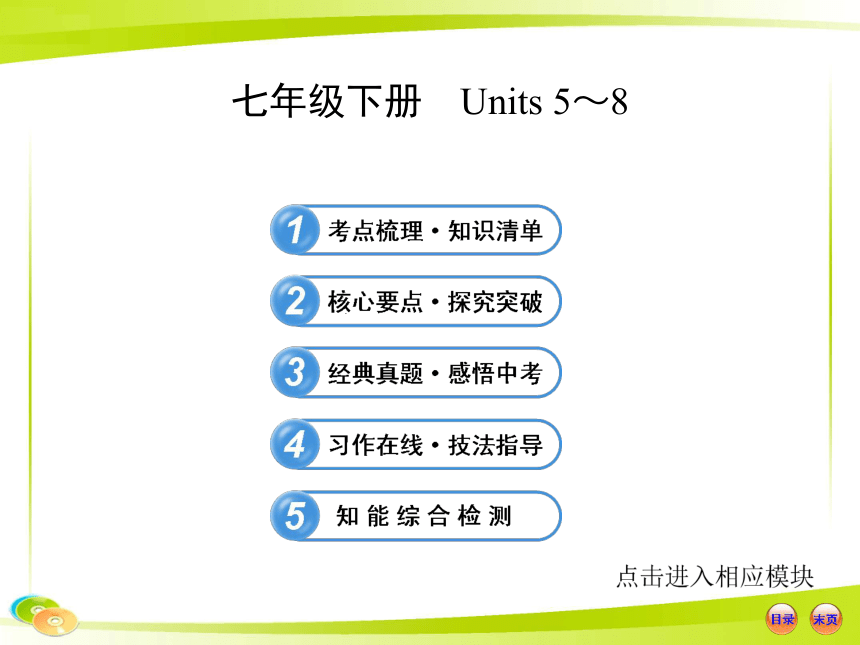 | |
| 格式 | zip | ||
| 文件大小 | 1.1MB | ||
| 资源类型 | 教案 | ||
| 版本资源 | 冀教版 | ||
| 科目 | 英语 | ||
| 更新时间 | 2014-03-01 23:11:45 | ||
图片预览

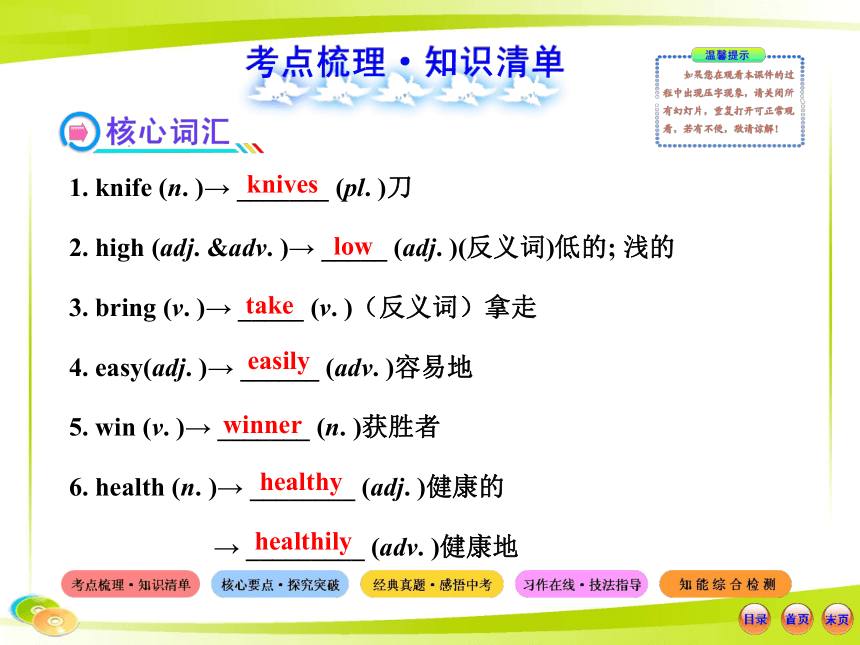
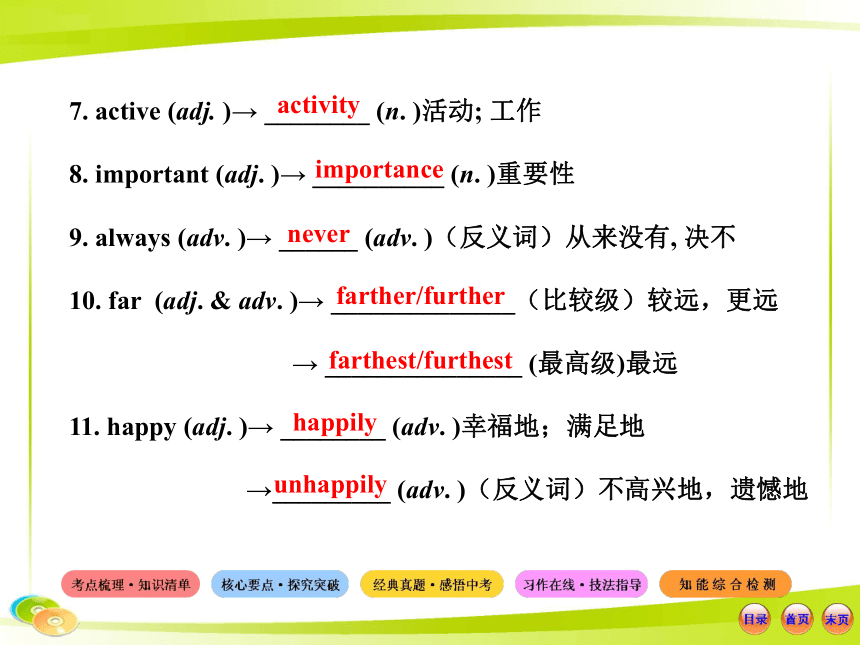
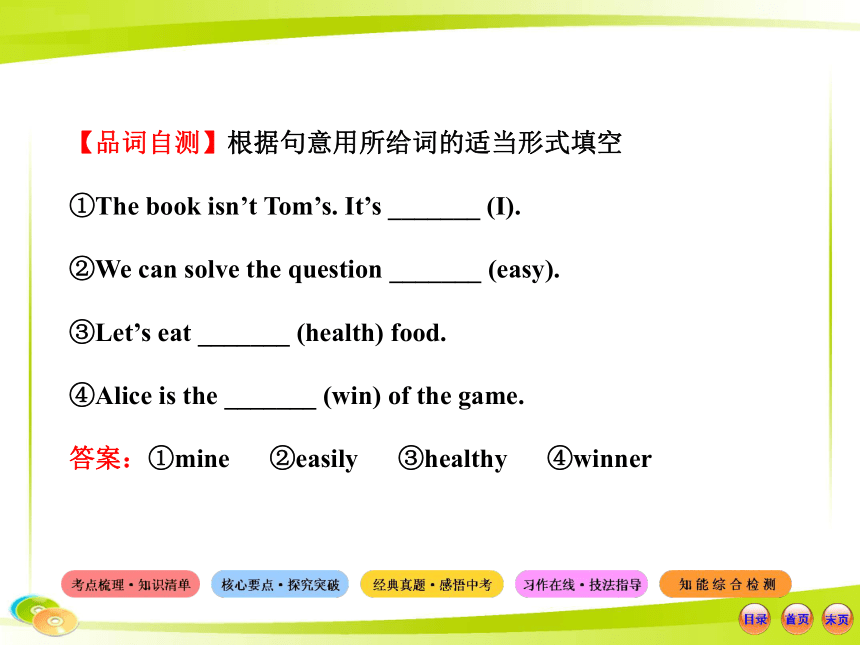
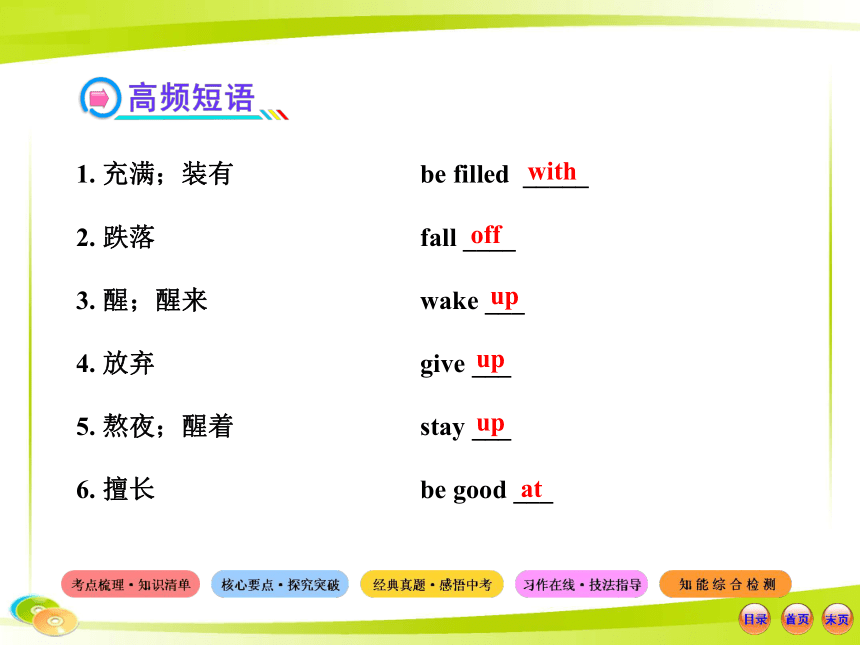
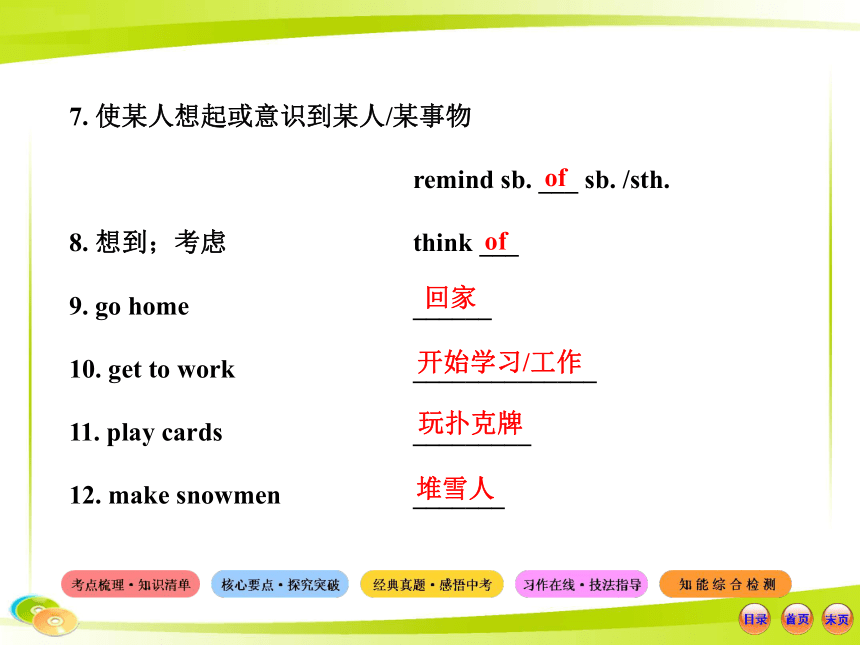
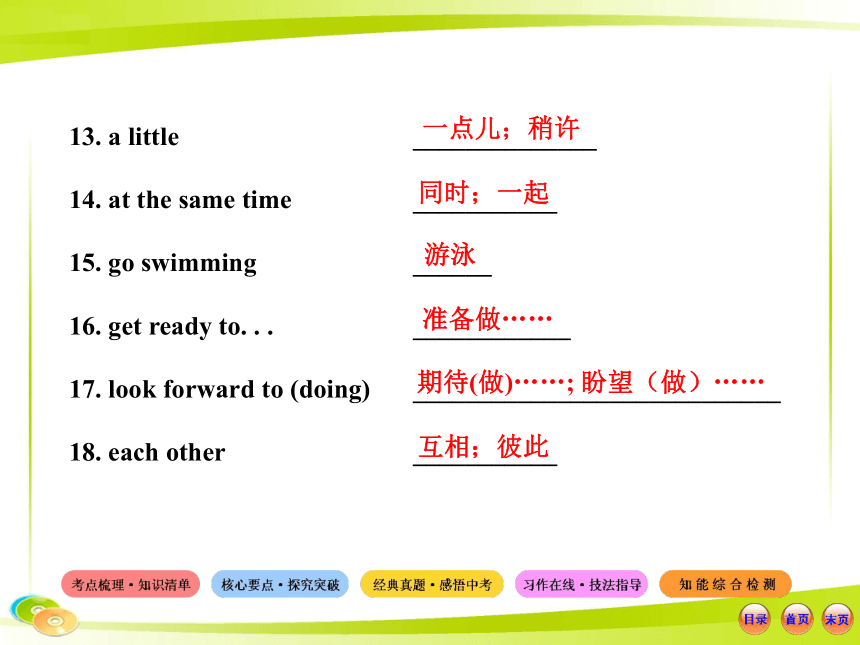
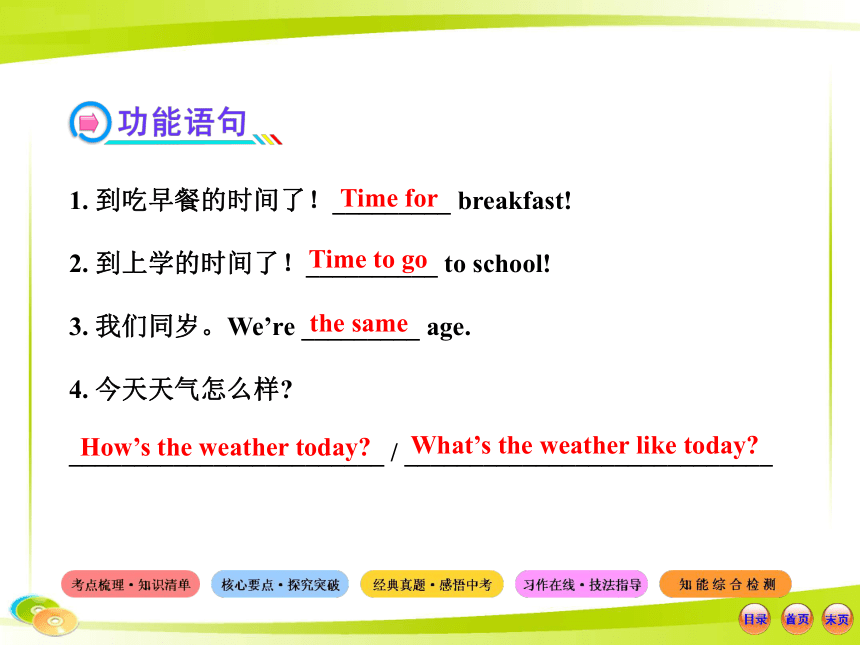
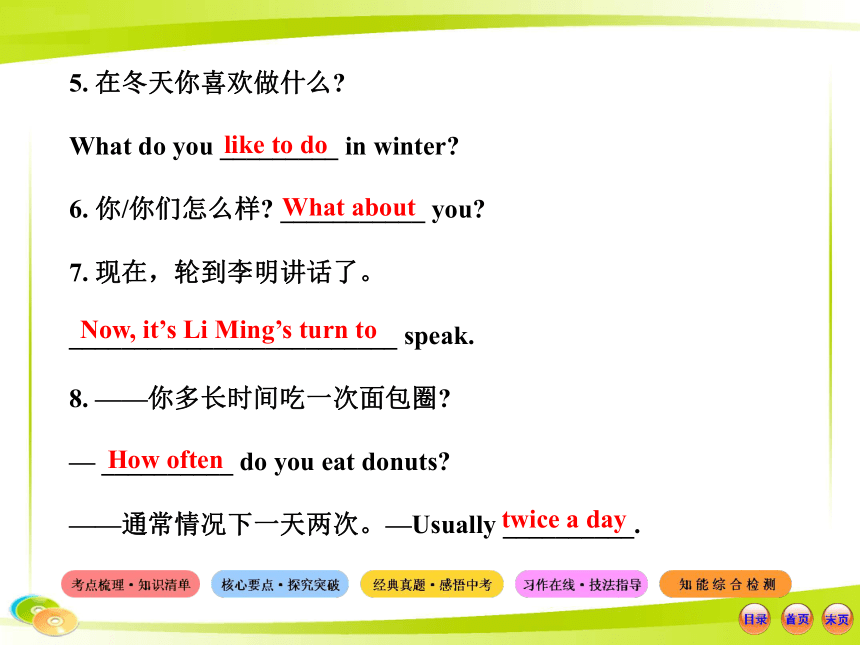
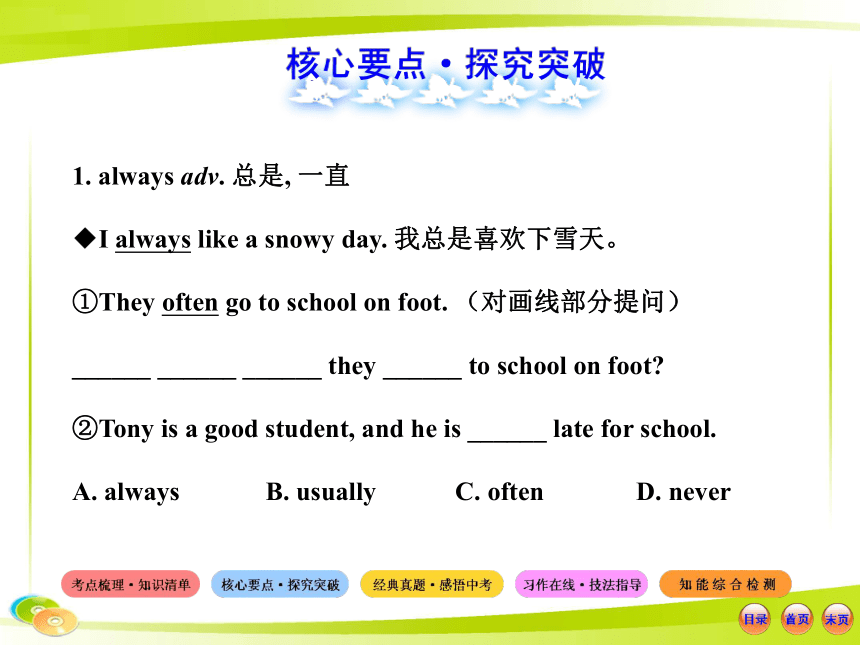
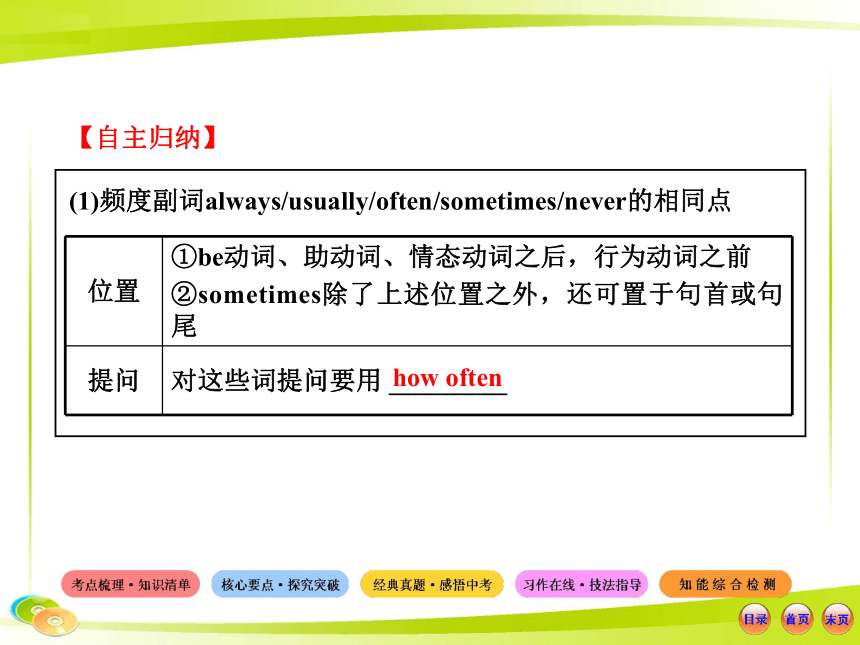
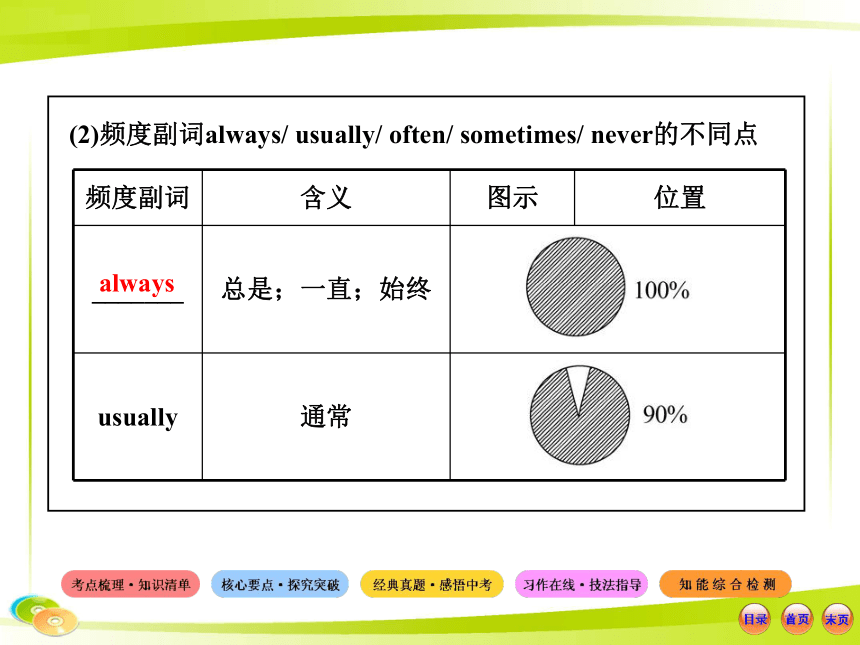
文档简介
课件55张PPT。七年级下册 Units 5~81. knife (n. )→ _______ (pl. )刀
2. high (adj. &adv. )→ _____ (adj. )(反义词)低的; 浅的
3. bring (v. )→ _____ (v. )(反义词)拿走
4. easy(adj. )→ ______ (adv. )容易地
5. win (v. )→ _______ (n. )获胜者
6. health (n. )→ ________ (adj. )健康的
→ _________ (adv. )健康地kniveslowtakeeasilywinnerhealthyhealthily7. active (adj. )→ ________ (n. )活动; 工作
8. important (adj. )→ __________ (n. )重要性
9. always (adv. )→ ______ (adv. )(反义词)从来没有, 决不
10. far (adj. & adv. )→ ______________(比较级)较远,更远
→ _______________ (最高级)最远
11. happy (adj. )→ ________ (adv. )幸福地;满足地
→_________ (adv. )(反义词)不高兴地,遗憾地activityimportanceneverfarther/furtherfarthest/furthesthappilyunhappily【品词自测】根据句意用所给词的适当形式填空
①The book isn’t Tom’s. It’s _______ (I).
②We can solve the question _______ (easy).
③Let’s eat _______ (health) food.
④Alice is the _______ (win) of the game.
答案:①mine ②easily ③healthy ④winner1. 充满;装有 be filled _____
2. 跌落 fall ____
3. 醒;醒来 wake ___
4. 放弃 give ___
5. 熬夜;醒着 stay ___
6. 擅长 be good ___withoffupupupat7. 使某人想起或意识到某人/某事物
remind sb. ___ sb. /sth.
8. 想到;考虑 think ___
9. go home ______
10. get to work ______________
11. play cards _________
12. make snowmen _______ofof回家开始学习/工作玩扑克牌堆雪人13. a little ______________
14. at the same time ___________
15. go swimming ______
16. get ready to. . . ____________
17. look forward to (doing) ____________________________
18. each other ___________一点儿;稍许同时;一起游泳准备做……期待(做)……; 盼望(做)……互相;彼此1. 到吃早餐的时间了!_________ breakfast!
2. 到上学的时间了!__________ to school!
3. 我们同岁。We’re _________ age.
4. 今天天气怎么样?
________________________ / ____________________________Time forTime to gothe sameHow’s the weather today?What’s the weather like today?5. 在冬天你喜欢做什么?
What do you _________ in winter?
6. 你/你们怎么样? ___________ you?
7. 现在,轮到李明讲话了。
_________________________ speak.
8. ——你多长时间吃一次面包圈?
— __________ do you eat donuts?
——通常情况下一天两次。—Usually __________. like to doWhat aboutNow, it’s Li Ming’s turn toHow oftentwice a day1. always adv. 总是, 一直
◆I always like a snowy day. 我总是喜欢下雪天。
①They often go to school on foot. (对画线部分提问)
______ ______ ______ they ______ to school on foot?
②Tony is a good student, and he is ______ late for school.
A. always B. usually C. often D. never【自主归纳】
(1)频度副词always/usually/often/sometimes/never的相同点how often(2)频度副词always/ usually/ often/ sometimes/ never的不同点always答案:①How often do; go ② Dnever2. other adj. 别的,其他的
◆In other places, there is brown, wet grass.
在其他地方有棕色的湿草。
①There is a pen in this hand. Can you guess what it is in _______ hand?
A. another B. some C. other D. the other②The banana pie tastes delicious. Could I have ______ one?
A. another B. other
C. the other D. others
③Students are usually interested in sports. Some like running; some like swimming; ______ like ball games.
A. others B. another
C. the other D. other【自主归纳】答案:①D ②A ③A3. win v. 获胜,赢得
◆Bob’s team won the game! 鲍勃队赢得了比赛!
①得知他在冲浪比赛中获得第一我们又惊讶又兴奋。
We were surprised and excited to know that he _______ the first prize in the surfing competition. ②Tom is good at playing chess, and he always ______ me at it.
A. hits B. beats C. wins D. loses
③——如果你输了这场比赛怎么办?
——不用担心。我不会输给他的。
—What will you do if you _____ the match?
—Don’t worry. I won’t _____ _____ him. 【自主归纳】 win和beat及lose和lose to的用法辨析
(1)____ +race, match, game,prize(即比赛、战争、奖
____ 品等)
(2)beat +比赛、竞争的对手(即指人或球队的名词
lose to 或代词)
答案:①won ②B ③lose;lose towinlose4. enough adj. &adv. 足够的(地)
◆I don’t do enough exercise. 我没做足够的训练。
①有足够10个人吃的食物。
There is _____ _____ for ten people to eat.
②The young man is ______ carry that heavy bag.
A. strong enough to B. enough strong to
C. not strong enough D. strong enough③Bill isn’t tall. He can’t reach the top of the door. (合并句子, 句意不变)
Bill isn’t _____ _____ _____ _____ the top of the door.
=Bill is _____ _____ _____ he can’t reach the top of the door.
=Bill is _____ _____ _____ _____ the top of the door. 【自主归纳】 enough的用法
(1)作形容词,意为“充足的, 足够的”,修饰名词,位置可前可后,常在前。
(2)作副词,意为“充足地, 足够地”,修饰形容词、副词或动词,但必须后置。
(3)enough的常用句式:
adj. /adv. +enough+(for sb. ) to do sth. (某人) 足够……做某事
=so+adj. /adv. +that从句
=too+adj. /adv. (+for sb. )+to do sth. 答案:①enough food ②A
③tall enough to reach; so short that; too short to reach5. —How often do you eat donuts? 你多久吃一次面包圈?
—Usually twice a day. 通常一天两次。
①—I wonder _______ you’ll water this kind of tree.
—Once a week.
A. how often B. how long
C. how far D. how much②— _______ have you lived in China?
—Since 2011.
A. How long B. How much
C. How often D. How soon答案:①A ②A【自主归纳】oftenlongsoonⅠ. 词汇运用
1. (2012·桂林中考)—Is it your dictionary?
—No, it’s not m_______.
2. (2012·宿迁中考)I’m looking forward to _______ (meet) my old friend, Jim, this Sunday.
3. (2012·滨州中考)Peter turned off the computer after he finished _______ (write) an e-mail.
答案:1. mine 2. meeting 3. writing 4. (2011·乌鲁木齐中考)Dao Lang’s songs are quite _______ (流行)today in the whole country.
5. (2011·梧州中考) I bought a new _______ (雨伞) in the shop last weekend.
6. (2011·凉山中考)My sister studies hard; she often finishes her homework _______ (容易).
7. (2011·南充中考) He spends more than an hour _______ (锻炼) every day.
答案:4. popular 5. umbrella 6. easily 7. exercisingⅡ. 单项选择
1. (2012·安徽中考)—Whose pen is this?
—Oh, it’s _______. I was looking for it everywhere.
A. you B. yours C. me D. mine
【解析】选D。由“我正在到处寻找它”可知上一句应该是“哦,它是我的”。故选D。2. (2012·河南中考)—Do you have any plans for this weekend?
—I’m not sure. I _______ go climbing Mount Yuntai.
A. must B. need C. may D. can
【解析】选C。may在此表示推测,意为“可能”。3. (2012·东营中考)—What’s on _______ side of the hill, mum?
—A big lake.
A. other B. others C. another D. the other
【解析】选D。在山的另一边用the other。4. (2012·六盘水中考)The little girl is not old enough to go to school.
A. too young B. too old
C. too small D. too big
【解析】选A。not old enough意为“不够大”,意为“too young(太小)。”5. (2012·南充中考)Don’t _______ up English. It’s very important.
A. give B. hurry C. stay
【解析】选A。give up是固定词组,意为“放弃”。6. (2012·泰安中考)Don’t _______ so often. It’s bad for your health.
A. get up B. stay up
C. look up D. come up
【解析】选B。get up起床;stay up熬夜;look up抬头, 查字典;come up走过来。句意:不要这么经常熬夜,对健康有害。故选B。7. (2012·临沂中考)English is my favorite subject and I am good _______ it.
A. for B. to C. at D. of
【解析】选C。be good at擅长……。8. (2011·德州中考) I _______ go to the theatre, because I don’t like operas at all.
A. always B. often
C. sometimes D. never
【解析】选D。这是一个由because引导的原因状语从句。由because I don’t like operas at all“因为我一点也不喜欢戏剧”可知我从不去剧院。9. (2011·连云港中考)—Oh, the traffic is so heavy.
—Let’s change _______ route to the airport.
A. other B. others
C. the other D. another
【解析】选D。考查不定代词。题干为“换别的路线”,而other为“另外的”;others后不能加名词;the other为“两者当中的另一个”;another表示“再,又;别的,其他的;任何一个”,指三者或三者以上中的任何一个。10. (2011·哈尔滨中考)Boys and girls, feeling peaceful is the first step to become _______ in the exam. So please take a deep breath and calm down.
A. runners B. winners C. players
【解析】选B。根据in the exam可知句意为“要成为考试中的获胜者,关键是心态平和”。runner奔跑者;winner获胜者;冠军;player队员;球员。11. (2011·广元中考)For a foreigner like me, the more I learn about Chinese history, _______ I enjoy living in China.
A. the better B. the more
C. the best
【解析】选B。句意:对于像我这样的外国人来说,我对中国历史了解得越多,我就越喜欢住在中国。由句意可知,这是“the +比较级,the+比较级”结构。12. (2011·北京中考)I knocked on the door, but _______ answered.
A. somebody B. nobody
C. anybody D. everybody
【解析】选B。考查不定代词。由句中but可知此处应该是没有人应答。somebody 某人,有人;nobody没有人;anybody任何人;everybody每个人。故选B。13. (2011·遵义中考) Sometimes I take a No. 31 bus to work.
A. by B. catch C. get
【解析】选B。take a bus =catch a bus 乘坐公共汽车。14. (2011·荆州中考) —What _______ do you like?
—I run every morning, and often play tennis at weekends.
A. sports B. music C. art D. subjects
【解析】选A。考查名词词义辨析。由run“跑步”和play tennis“打网球”可知所做之事均属sports范畴,故选A。Ⅲ. 按要求完成句子
1. (2012·宿迁中考)我们已经好多年没有见面了,但是我们不时地通邮件。
We haven’t seen each other for many years, but we send emails ______ ______ ______ ______ .
2. (2011·乌鲁木齐中考)I’m surprised to find great changes have taken place in China. (改为同义句)
______ my ______, I find great changes have taken place in China.
答案:1. from time to time 2. To; surprise 3. (2011·广安中考)My daughter is looking forward to ______ (收集) more stamps.
4. (2011·天津中考)如果你对这个俱乐部感兴趣,请填写这张申请表。
If you are interested in this club, please ______ ______ this application form.
答案:3. collecting 4. fill in 调查报告是近几年中考书面表达题目的新型题目,其中多以初中生身边的事物为调查内容。在写作此类话题作文过程中可以在原有提示内容的基础上结合身边现实情况加以佐证补充。【典题示例】
(2012·宿迁中考)
江苏省教育厅5月7日公布的2011年学生体质健康调查结果显示,学生近视率仍维持在高位水平,且越来越低龄化。请根据下表所提示的内容,用英语写一篇短文,并发表自己的观点。 注意:1. 词数80左右。开头已经写好,不计入总词数;
2. 内容必须包括上表中的要点,可作必要的发挥;
3. 条理清楚、语句连贯;
4. 文中不得出现真实的地名、校名和人名等信息。
(参考词汇:近视的 shortsighted)
The survey shows that many students have become shortsighted at a very young age. At present, _______________
____________________________________________________________________________________________________________【审题谋篇】
1. 本篇文章要求根据调查报告写一篇有关学生体质健康的说明文,主要考查学生根据所给提示信息,综合理解和运用语言的能力。
2. 人称:第三人称;
3. 主要时态:一般现在时 4. 高分模板:【佳作诵读】
The survey shows that many students have become shortsighted at a very young age. At present, about 70% of students are shortsighted. Here are some main causes.
Some students don’t have enough sleep. Some students spend too much time reading or doing their homework without a rest. Some students even like to watch TV or use computers for a long time. In order to have good eyesight, we should do eye exercises every day. We can also try to do more sports in our spare time. We should have the good habit of using our eyes.
I think all of us should understand the importance of protecting eyes and try our best to protect our eyes. 【名师点睛】
(1)本文通过at present, here are. . . , in order to, I think等短语和句型的运用使文章衔接自然、结构合理。
(2)最后一段提出了保护眼睛的倡议,使主题得以深化,达到了首尾呼应的目的。
2. high (adj. &adv. )→ _____ (adj. )(反义词)低的; 浅的
3. bring (v. )→ _____ (v. )(反义词)拿走
4. easy(adj. )→ ______ (adv. )容易地
5. win (v. )→ _______ (n. )获胜者
6. health (n. )→ ________ (adj. )健康的
→ _________ (adv. )健康地kniveslowtakeeasilywinnerhealthyhealthily7. active (adj. )→ ________ (n. )活动; 工作
8. important (adj. )→ __________ (n. )重要性
9. always (adv. )→ ______ (adv. )(反义词)从来没有, 决不
10. far (adj. & adv. )→ ______________(比较级)较远,更远
→ _______________ (最高级)最远
11. happy (adj. )→ ________ (adv. )幸福地;满足地
→_________ (adv. )(反义词)不高兴地,遗憾地activityimportanceneverfarther/furtherfarthest/furthesthappilyunhappily【品词自测】根据句意用所给词的适当形式填空
①The book isn’t Tom’s. It’s _______ (I).
②We can solve the question _______ (easy).
③Let’s eat _______ (health) food.
④Alice is the _______ (win) of the game.
答案:①mine ②easily ③healthy ④winner1. 充满;装有 be filled _____
2. 跌落 fall ____
3. 醒;醒来 wake ___
4. 放弃 give ___
5. 熬夜;醒着 stay ___
6. 擅长 be good ___withoffupupupat7. 使某人想起或意识到某人/某事物
remind sb. ___ sb. /sth.
8. 想到;考虑 think ___
9. go home ______
10. get to work ______________
11. play cards _________
12. make snowmen _______ofof回家开始学习/工作玩扑克牌堆雪人13. a little ______________
14. at the same time ___________
15. go swimming ______
16. get ready to. . . ____________
17. look forward to (doing) ____________________________
18. each other ___________一点儿;稍许同时;一起游泳准备做……期待(做)……; 盼望(做)……互相;彼此1. 到吃早餐的时间了!_________ breakfast!
2. 到上学的时间了!__________ to school!
3. 我们同岁。We’re _________ age.
4. 今天天气怎么样?
________________________ / ____________________________Time forTime to gothe sameHow’s the weather today?What’s the weather like today?5. 在冬天你喜欢做什么?
What do you _________ in winter?
6. 你/你们怎么样? ___________ you?
7. 现在,轮到李明讲话了。
_________________________ speak.
8. ——你多长时间吃一次面包圈?
— __________ do you eat donuts?
——通常情况下一天两次。—Usually __________. like to doWhat aboutNow, it’s Li Ming’s turn toHow oftentwice a day1. always adv. 总是, 一直
◆I always like a snowy day. 我总是喜欢下雪天。
①They often go to school on foot. (对画线部分提问)
______ ______ ______ they ______ to school on foot?
②Tony is a good student, and he is ______ late for school.
A. always B. usually C. often D. never【自主归纳】
(1)频度副词always/usually/often/sometimes/never的相同点how often(2)频度副词always/ usually/ often/ sometimes/ never的不同点always答案:①How often do; go ② Dnever2. other adj. 别的,其他的
◆In other places, there is brown, wet grass.
在其他地方有棕色的湿草。
①There is a pen in this hand. Can you guess what it is in _______ hand?
A. another B. some C. other D. the other②The banana pie tastes delicious. Could I have ______ one?
A. another B. other
C. the other D. others
③Students are usually interested in sports. Some like running; some like swimming; ______ like ball games.
A. others B. another
C. the other D. other【自主归纳】答案:①D ②A ③A3. win v. 获胜,赢得
◆Bob’s team won the game! 鲍勃队赢得了比赛!
①得知他在冲浪比赛中获得第一我们又惊讶又兴奋。
We were surprised and excited to know that he _______ the first prize in the surfing competition. ②Tom is good at playing chess, and he always ______ me at it.
A. hits B. beats C. wins D. loses
③——如果你输了这场比赛怎么办?
——不用担心。我不会输给他的。
—What will you do if you _____ the match?
—Don’t worry. I won’t _____ _____ him. 【自主归纳】 win和beat及lose和lose to的用法辨析
(1)____ +race, match, game,prize(即比赛、战争、奖
____ 品等)
(2)beat +比赛、竞争的对手(即指人或球队的名词
lose to 或代词)
答案:①won ②B ③lose;lose towinlose4. enough adj. &adv. 足够的(地)
◆I don’t do enough exercise. 我没做足够的训练。
①有足够10个人吃的食物。
There is _____ _____ for ten people to eat.
②The young man is ______ carry that heavy bag.
A. strong enough to B. enough strong to
C. not strong enough D. strong enough③Bill isn’t tall. He can’t reach the top of the door. (合并句子, 句意不变)
Bill isn’t _____ _____ _____ _____ the top of the door.
=Bill is _____ _____ _____ he can’t reach the top of the door.
=Bill is _____ _____ _____ _____ the top of the door. 【自主归纳】 enough的用法
(1)作形容词,意为“充足的, 足够的”,修饰名词,位置可前可后,常在前。
(2)作副词,意为“充足地, 足够地”,修饰形容词、副词或动词,但必须后置。
(3)enough的常用句式:
adj. /adv. +enough+(for sb. ) to do sth. (某人) 足够……做某事
=so+adj. /adv. +that从句
=too+adj. /adv. (+for sb. )+to do sth. 答案:①enough food ②A
③tall enough to reach; so short that; too short to reach5. —How often do you eat donuts? 你多久吃一次面包圈?
—Usually twice a day. 通常一天两次。
①—I wonder _______ you’ll water this kind of tree.
—Once a week.
A. how often B. how long
C. how far D. how much②— _______ have you lived in China?
—Since 2011.
A. How long B. How much
C. How often D. How soon答案:①A ②A【自主归纳】oftenlongsoonⅠ. 词汇运用
1. (2012·桂林中考)—Is it your dictionary?
—No, it’s not m_______.
2. (2012·宿迁中考)I’m looking forward to _______ (meet) my old friend, Jim, this Sunday.
3. (2012·滨州中考)Peter turned off the computer after he finished _______ (write) an e-mail.
答案:1. mine 2. meeting 3. writing 4. (2011·乌鲁木齐中考)Dao Lang’s songs are quite _______ (流行)today in the whole country.
5. (2011·梧州中考) I bought a new _______ (雨伞) in the shop last weekend.
6. (2011·凉山中考)My sister studies hard; she often finishes her homework _______ (容易).
7. (2011·南充中考) He spends more than an hour _______ (锻炼) every day.
答案:4. popular 5. umbrella 6. easily 7. exercisingⅡ. 单项选择
1. (2012·安徽中考)—Whose pen is this?
—Oh, it’s _______. I was looking for it everywhere.
A. you B. yours C. me D. mine
【解析】选D。由“我正在到处寻找它”可知上一句应该是“哦,它是我的”。故选D。2. (2012·河南中考)—Do you have any plans for this weekend?
—I’m not sure. I _______ go climbing Mount Yuntai.
A. must B. need C. may D. can
【解析】选C。may在此表示推测,意为“可能”。3. (2012·东营中考)—What’s on _______ side of the hill, mum?
—A big lake.
A. other B. others C. another D. the other
【解析】选D。在山的另一边用the other。4. (2012·六盘水中考)The little girl is not old enough to go to school.
A. too young B. too old
C. too small D. too big
【解析】选A。not old enough意为“不够大”,意为“too young(太小)。”5. (2012·南充中考)Don’t _______ up English. It’s very important.
A. give B. hurry C. stay
【解析】选A。give up是固定词组,意为“放弃”。6. (2012·泰安中考)Don’t _______ so often. It’s bad for your health.
A. get up B. stay up
C. look up D. come up
【解析】选B。get up起床;stay up熬夜;look up抬头, 查字典;come up走过来。句意:不要这么经常熬夜,对健康有害。故选B。7. (2012·临沂中考)English is my favorite subject and I am good _______ it.
A. for B. to C. at D. of
【解析】选C。be good at擅长……。8. (2011·德州中考) I _______ go to the theatre, because I don’t like operas at all.
A. always B. often
C. sometimes D. never
【解析】选D。这是一个由because引导的原因状语从句。由because I don’t like operas at all“因为我一点也不喜欢戏剧”可知我从不去剧院。9. (2011·连云港中考)—Oh, the traffic is so heavy.
—Let’s change _______ route to the airport.
A. other B. others
C. the other D. another
【解析】选D。考查不定代词。题干为“换别的路线”,而other为“另外的”;others后不能加名词;the other为“两者当中的另一个”;another表示“再,又;别的,其他的;任何一个”,指三者或三者以上中的任何一个。10. (2011·哈尔滨中考)Boys and girls, feeling peaceful is the first step to become _______ in the exam. So please take a deep breath and calm down.
A. runners B. winners C. players
【解析】选B。根据in the exam可知句意为“要成为考试中的获胜者,关键是心态平和”。runner奔跑者;winner获胜者;冠军;player队员;球员。11. (2011·广元中考)For a foreigner like me, the more I learn about Chinese history, _______ I enjoy living in China.
A. the better B. the more
C. the best
【解析】选B。句意:对于像我这样的外国人来说,我对中国历史了解得越多,我就越喜欢住在中国。由句意可知,这是“the +比较级,the+比较级”结构。12. (2011·北京中考)I knocked on the door, but _______ answered.
A. somebody B. nobody
C. anybody D. everybody
【解析】选B。考查不定代词。由句中but可知此处应该是没有人应答。somebody 某人,有人;nobody没有人;anybody任何人;everybody每个人。故选B。13. (2011·遵义中考) Sometimes I take a No. 31 bus to work.
A. by B. catch C. get
【解析】选B。take a bus =catch a bus 乘坐公共汽车。14. (2011·荆州中考) —What _______ do you like?
—I run every morning, and often play tennis at weekends.
A. sports B. music C. art D. subjects
【解析】选A。考查名词词义辨析。由run“跑步”和play tennis“打网球”可知所做之事均属sports范畴,故选A。Ⅲ. 按要求完成句子
1. (2012·宿迁中考)我们已经好多年没有见面了,但是我们不时地通邮件。
We haven’t seen each other for many years, but we send emails ______ ______ ______ ______ .
2. (2011·乌鲁木齐中考)I’m surprised to find great changes have taken place in China. (改为同义句)
______ my ______, I find great changes have taken place in China.
答案:1. from time to time 2. To; surprise 3. (2011·广安中考)My daughter is looking forward to ______ (收集) more stamps.
4. (2011·天津中考)如果你对这个俱乐部感兴趣,请填写这张申请表。
If you are interested in this club, please ______ ______ this application form.
答案:3. collecting 4. fill in 调查报告是近几年中考书面表达题目的新型题目,其中多以初中生身边的事物为调查内容。在写作此类话题作文过程中可以在原有提示内容的基础上结合身边现实情况加以佐证补充。【典题示例】
(2012·宿迁中考)
江苏省教育厅5月7日公布的2011年学生体质健康调查结果显示,学生近视率仍维持在高位水平,且越来越低龄化。请根据下表所提示的内容,用英语写一篇短文,并发表自己的观点。 注意:1. 词数80左右。开头已经写好,不计入总词数;
2. 内容必须包括上表中的要点,可作必要的发挥;
3. 条理清楚、语句连贯;
4. 文中不得出现真实的地名、校名和人名等信息。
(参考词汇:近视的 shortsighted)
The survey shows that many students have become shortsighted at a very young age. At present, _______________
____________________________________________________________________________________________________________【审题谋篇】
1. 本篇文章要求根据调查报告写一篇有关学生体质健康的说明文,主要考查学生根据所给提示信息,综合理解和运用语言的能力。
2. 人称:第三人称;
3. 主要时态:一般现在时 4. 高分模板:【佳作诵读】
The survey shows that many students have become shortsighted at a very young age. At present, about 70% of students are shortsighted. Here are some main causes.
Some students don’t have enough sleep. Some students spend too much time reading or doing their homework without a rest. Some students even like to watch TV or use computers for a long time. In order to have good eyesight, we should do eye exercises every day. We can also try to do more sports in our spare time. We should have the good habit of using our eyes.
I think all of us should understand the importance of protecting eyes and try our best to protect our eyes. 【名师点睛】
(1)本文通过at present, here are. . . , in order to, I think等短语和句型的运用使文章衔接自然、结构合理。
(2)最后一段提出了保护眼睛的倡议,使主题得以深化,达到了首尾呼应的目的。
